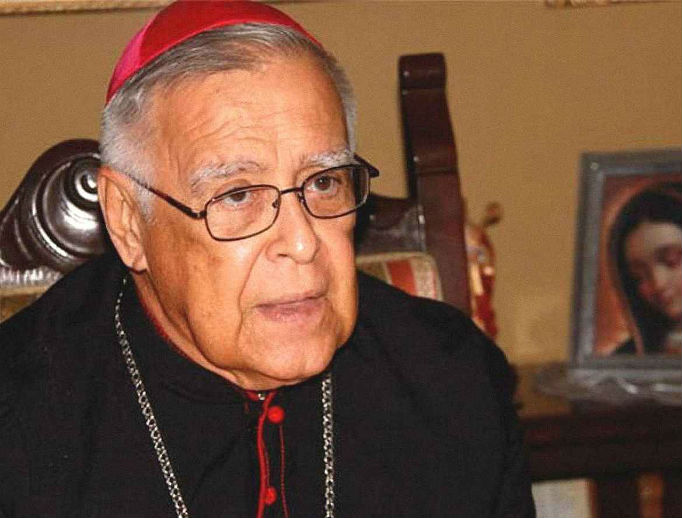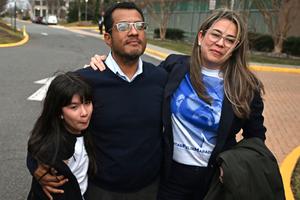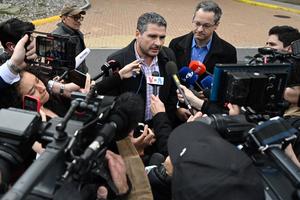Venezuelan Archbishop Luckert: ‘What We Have Right Now in Venezuela Is Misery’
In an exclusive Register interview, the archbishop discusses the plight of his people as they endure Venezuela’s ongoing political and economic crisis.

Venezuelan Archbishop Roberto Luckert sat down with Register staff writer Lauretta Brown at the State Department’s Ministerial to Advance Religious Freedom this week to discuss the hardships his country is facing under the regime of Nicolas Maduro.
The archbishop, who is the president of the Venezuelan Church’s Peace and Justice Commission, discussed the unity of the Venezuelan bishops and the Church, in calling recently for political change in the country. He also discusses the Maduro government’s antagonism towards the local Church, the problem of human trafficking, and what U.S. Catholics can do to help his beleaguered nation.
My first question is about the Church in Venezuela. What hardships are they facing?
At this particular moment, there’s no outright religious persecution, but there is a very severe antagonism towards the faith on the part of the government.
The fact that I am willing to meet with any opposition leader automatically brands me an enemy of the state, and, hence, the government would be interested in persecuting me, but they do not mess with me because I speak well. In my country, they say that I am a political bishop, but to be political is, in fact, not necessarily to be antagonistic but to work for the common good and for the common good of all Venezuelans.
President Trump has done a very good thing. He has opened our eyes and made us realize how much Venezuelan money is in international banks outside of Venezuela. It is truly a scandal to consider that, in the 20 years that this government has been in power, what little they have done to help the average Venezuelan and to help our country advance.
In Venezuela, we do not have any food; in Venezuela we do not have any medicine. In my case, for example, I have to take medicine continually, and there is no way that someone with a minimum wage would be able to even come close to affording the medicines that I would have to take.
What needs to happen to address this crisis?
The essential problem is the problem of bad governance; if we improve the governance we can address the current crisis in Venezuela. Venezuela is a very, very wealthy country. It has an abundance of natural resources. It has gold; it has petroleum; it has coal.
Most of all Venezuela is extremely wealthy, in the people that it has. Seventy percent of Venezuelans are under the age of 30. … It’s a very young country.
Will the Venezuelan episcopal conference continue to denounce the government?
For the past 20 years, the episcopal conference of Venezuela has been raising its prophetic voice on behalf of vulnerable populations in Venezuela and defending the constitutional order. It is a scandal that a country as rich as Venezuela is not really living in poverty but living in what is worse: misery — and one can say that poverty can be virtuous for a Christian, but misery is never virtuous. Misery is never just; misery is unjust. And what we have right now in Venezuela is misery.
Given the backing of the bishops of Latin America and Pope Francis’ recent Angelus prayer of support, do you think the entire Church is now uniting in support of the Venezuelan bishops’ appeal for political change?
The short answer is: Yes, we do believe that CELAM [the Latin American Episcopal Council] and the entire Catholic world are behind us, principally because we at the Venezuelan Episcopal Conference are entirely united. We present a common front against those who would seek to disarticulate, who would seek to harm the Church’s prophetic mission; and I would say that the root of that universal support that we are receiving is the fact that the Venezuelan bishops themselves are perfectly united in this effort.
Could you speak about the human trafficking in Venezuela, which you recently wrote about?
So this is a horrible, horrible problem that we are suffering at the moment: human trafficking. There are transnational criminal organizations in Venezuela who are taking young girls, young women, children and using them for sex trafficking; also using them for organ trafficking via Trinidad. The Venezuelan woman has a reputation for being very beautiful across Latin America, and so the mafias are exploiting this to take sex slaves — but also not just sex trafficking. You also have labor trafficking; grown men being taken as labor slaves. It’s happening now. You never saw that in Venezuela before today.
How can U.S. Catholics respond to the crisis in Venezuela?
One thing that I do ask is that American Catholics truly should try to understand the situation in Venezuela. Venezuela has traditionally been a rich country that has not emigrated; but now over 5 million Venezuelans have left their country, and if Venezuelans are coming here, it’s because they’re at the end of their rope.
American Catholics should also be aware that Venezuela right now is being governed by a cabal of really hateful people who hate the United States, and we are grateful for Trump’s recent actions: freezing Venezuelan assets here in the United States.
Also, you have to be mindful that this cabal running Venezuela at the moment is selling this propaganda that the United States is on the verge of invading. Reasonable Venezuelans know that the United States is not at the point of invading. The United States has oil, and they’re interested in buying it, not taking it. The Maduro regime is selling this very dumb type of patriotism — anti-American. Every day he says something similar: “The gringos are going to invade; let’s prepare” — and then he conducts these stupid military exercises.
Editor’s Note: Christopher Ljungquist, an international policy adviser with the U.S. Conference of Catholic Bishops’ Office of International Justice and Peace, assisted in translating this interview.
- Keywords:
- lauretta brown
- venezuela

















